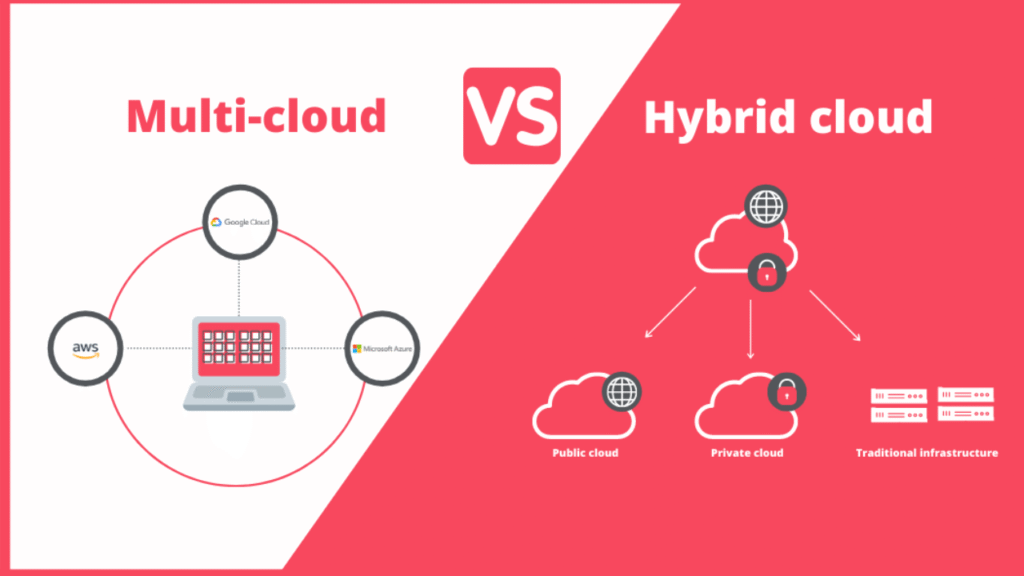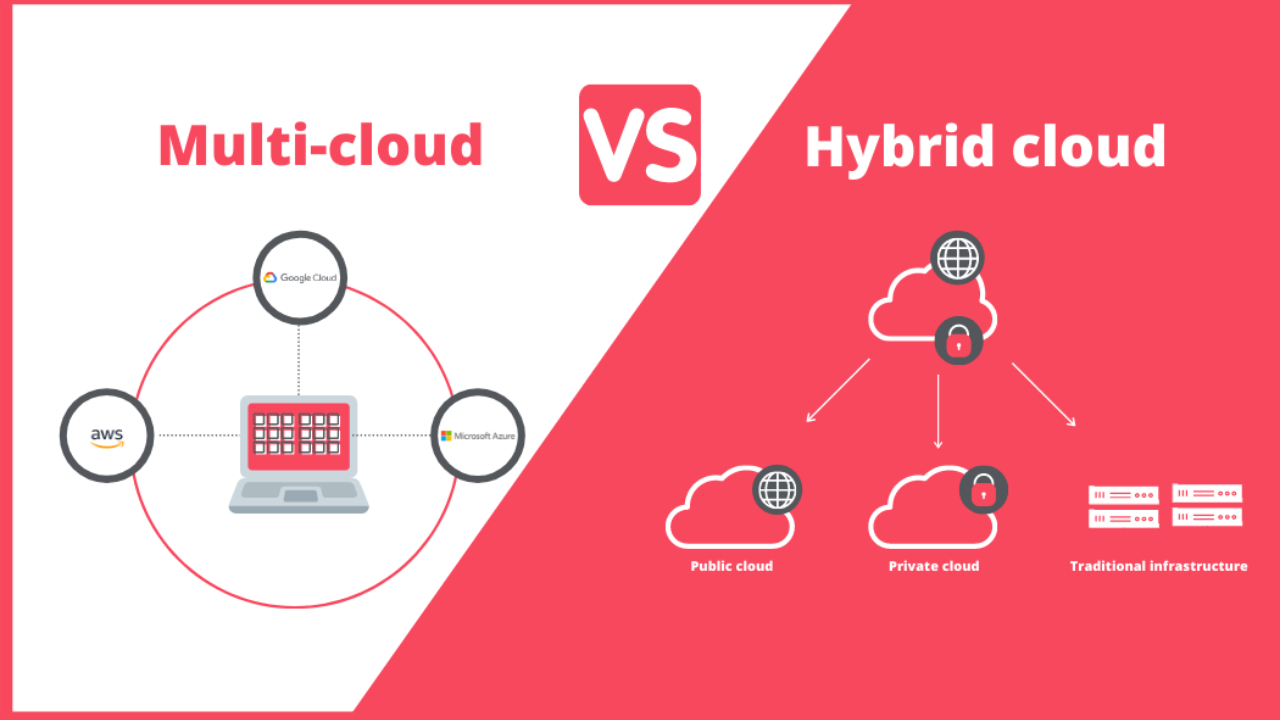
Overview Table: Multi-Cloud vs. Hybrid Cloud at a Glance
| Feature | Multi-Cloud | Hybrid Cloud |
|---|---|---|
| Definition | Use of multiple cloud providers | Combination of public & private clouds |
| Key Benefit | Avoid vendor lock-in | Greater control and data flexibility |
| Complexity | Higher (multiple vendors) | Medium (integration of public/private) |
| Security Control | Varies per provider | Higher, especially in private cloud |
| Use Case Example | SaaS company using AWS + Azure | Bank hosting sensitive data on-prem + cloud |
| Ideal For | Businesses seeking vendor diversity | Companies with compliance requirements |
Cloud Confusion: Multi-Cloud or Hybrid Cloud?
If your organization is moving to the cloud—or expanding its cloud presence—you’ve likely faced this question: Should we go multi-cloud or hybrid cloud?
Both strategies offer unique advantages and challenges, but choosing the right one can directly impact cost, security, performance, and agility. This article will break down both options, compare them side-by-side, and help you decide which architecture fits your goals.
What Is Multi-Cloud?
Multi-cloud refers to using two or more cloud service providers (CSPs) for various workloads or services. These may include AWS, Google Cloud, Microsoft Azure, IBM Cloud, or others. The key idea is diversification—not relying solely on a single provider.
Why Organizations Choose Multi-Cloud:
- Avoid vendor lock-in: Switching providers becomes easier.
- Best-of-breed services: Use AWS for storage, Azure for AI, GCP for analytics.
- Redundancy: If one provider has downtime, others keep you running.
- Geographical flexibility: Reach global markets more effectively.
What Is Hybrid Cloud?
A hybrid cloud architecture blends private cloud (on-premises or hosted) with public cloud services, allowing data and applications to move between them. The integration allows businesses to keep sensitive workloads in-house while benefiting from the scalability of the public cloud.
Why Organizations Choose Hybrid Cloud:
- Security compliance: Keep regulated data in a private environment.
- Legacy systems: Many enterprises can’t move everything to the public cloud.
- Flexibility: Scale to public cloud during peak loads.
- Gradual migration: Move workloads to the cloud at your own pace.
Head-to-Head Comparison: Multi-Cloud vs Hybrid Cloud
| Criteria | Multi-Cloud | Hybrid Cloud |
|---|---|---|
| Architecture | Mix of public cloud vendors | Mix of private + public clouds |
| Vendor Diversity | High | Low to moderate |
| Control & Security | Depends on provider and setup | Higher control in private environments |
| Complexity to Manage | High (multiple APIs, tools, billing) | Moderate (integration needed but fewer vendors) |
| Downtime Resilience | Better (failover across vendors) | Depends on public-private integration |
| Cost Optimization | Potentially lower with competitive pricing | Higher cost to maintain private infrastructure |
Use Case Examples
Multi-Cloud in Action:
A global software company uses AWS for hosting apps, Azure for AI/ML services, and GCP for big data analytics. They route workloads based on pricing, latency, or regional performance.
Hybrid Cloud in Action:
A healthcare provider keeps patient records in a private cloud (HIPAA compliance) while using public cloud to run front-end web apps and telehealth services.
Benefits Breakdown
Multi-Cloud Benefits:
- Reduced reliance on a single vendor
- Access to specialized features across providers
- Improved uptime and resilience
- Flexible pricing strategies
Hybrid Cloud Benefits:
- Enhanced security for sensitive workloads
- Utilization of legacy infrastructure
- Regulatory compliance
- Seamless scalability during high-demand periods
Challenges to Consider
| Challenge | Multi-Cloud | Hybrid Cloud |
|---|---|---|
| Management Complexity | High—multiple platforms and policies | Integration between private and public cloud |
| Security Consistency | Varies—hard to standardize policies | Easier to control on-prem systems |
| Skill Requirements | Teams need expertise across vendors | Deep knowledge of hybrid networking |
| Cost Visibility | Hard to track spend across vendors | Better clarity but high upfront costs |
Which Is Better for You?
The right choice depends on your business needs:
- Choose Multi-Cloud if:
- You want to avoid vendor lock-in.
- You seek access to best-in-class services from different vendors.
- Your workloads are mostly cloud-native and scalable.
- Choose Hybrid Cloud if:
- You handle sensitive or regulated data.
- You want to modernize legacy systems gradually.
- You require strict security controls with cloud scalability.
Some enterprises even combine both strategies, running a hybrid setup within a multi-cloud environment—though this adds even more complexity.
Future Outlook: The Rise of Unified Management
Both strategies are trending upwards, but the real future lies in unified multi-cloud and hybrid platforms. Tools like VMware Tanzu, Microsoft Arc, and Google Anthos are helping companies manage hybrid and multi-cloud environments from a single dashboard, bridging the gap between flexibility and simplicity.
As cloud technology matures, businesses will lean toward platform-agnostic, container-based solutions that allow apps and data to move freely across private and public environments—no matter the provider.
Final Thoughts
The debate between multi-cloud and hybrid cloud isn’t about which is universally “better”—it’s about which is better for you.
If you want agility, provider flexibility, and cutting-edge features, multi-cloud is your answer. If you’re focused on compliance, control, and protecting legacy infrastructure, hybrid cloud may be the safer bet.
Evaluate your business goals, risk tolerance, budget, and existing IT infrastructure to make the right call. And remember: cloud strategy isn’t one-size-fits-all—it’s what fits your future.
3 Quick One-Line FAQs
Q1: Can I use both multi-cloud and hybrid cloud together?
Yes, many organizations use a hybrid environment that spans multiple public cloud providers.
Q2: Which is more secure—multi-cloud or hybrid cloud?
Hybrid cloud generally offers stronger security control, especially for sensitive data.
Q3: Is multi-cloud more expensive than hybrid cloud?
Not always—it depends on your provider mix, architecture, and management tools.

